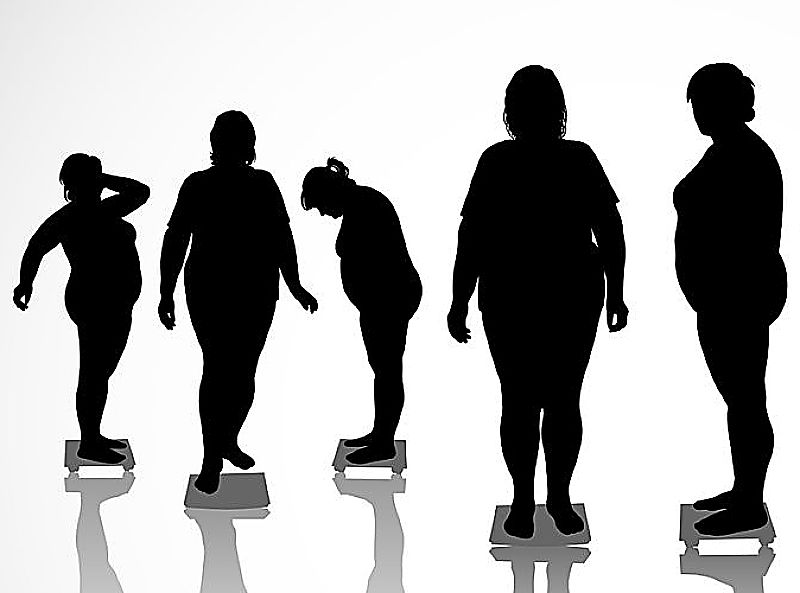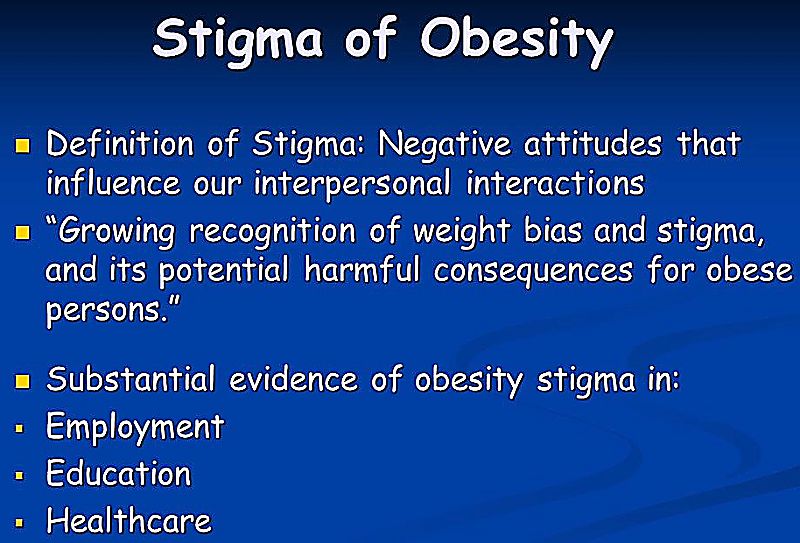West Exports Fat Stigma - Diets, Food and Lifestyles Make the World Fat
The obesity epidemic around the world is causing major health problems and a world-wide fat stigma has developed. It's ironic that many people have blamed the world obesity epidemic on the widespread adoption of Western diets, food and lifestyles and now the West has exported its fat stigma. The overweight and obese now face the demeaning stigma of being fat as societies around the world are becoming more prejudiced against fat people. Even the traditional fat-positive ('fat-loving') societies are changing their attitudes and developing fat stigmas and acquiring 'Fat is bad, Thin is In' attitudes.
Many human conditions are stigmatized, such as racial membership and physical handicaps, but the stigma associated with being obese or overweight may be the most harmful and debilitating both the to individual and to the general population.
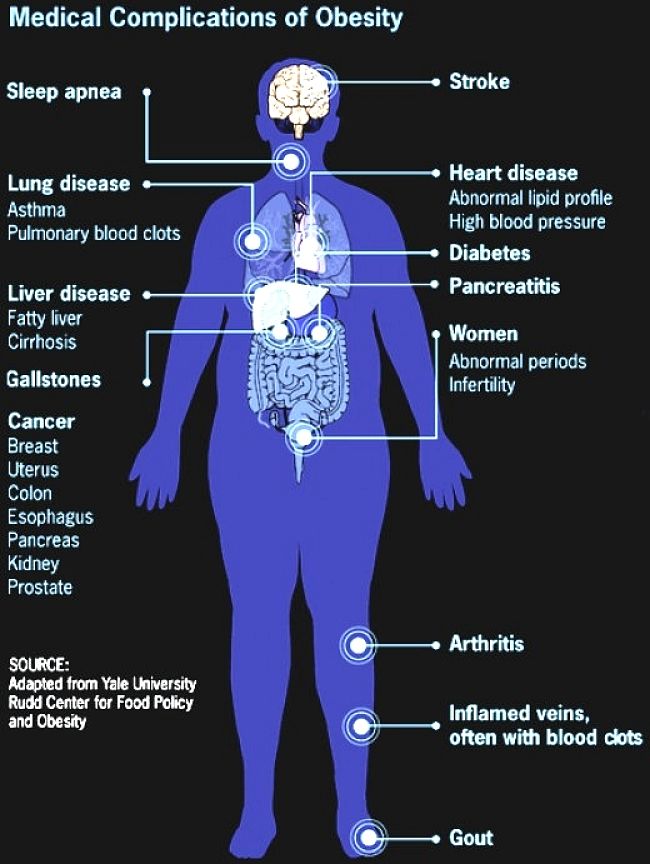
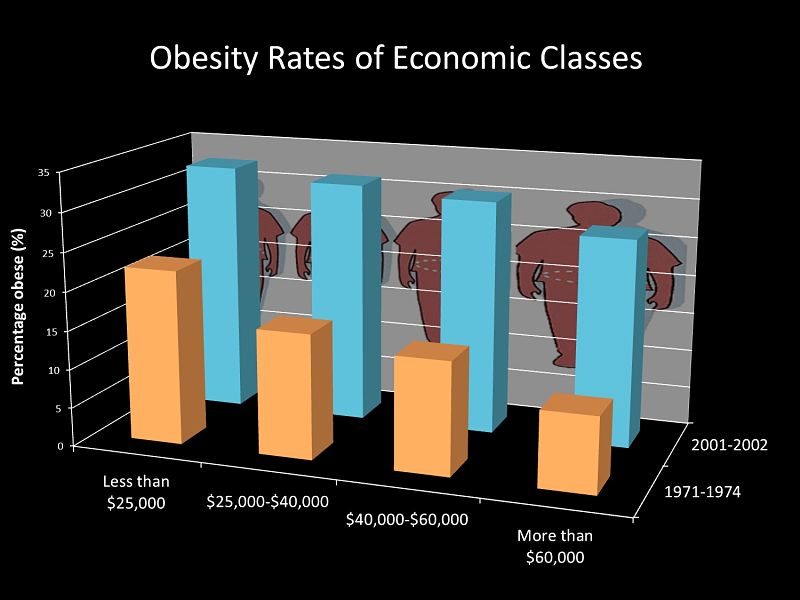
In 2005, about 25% of the world's adult population was overweight and 10% was obese. About 940 million adults in the world were overweight and about 400 million were obese. If this trend continues, the number of overweight individuals will double, to about two billion (about 60%), by about 2030, when the number of obese adults will increase to about one billion (about 30%). The Fat Sigma will soon apply to more than half the population of the world.
- How much of this Fat Stigma is due to the promotion of slim bodies in advertising around the world?
- How much of the world obesity epidemic is due to of the fast-food 'upsize me' promotions and the adoption of western diets throughout the world.?
- How much of this is stigma is due to the advertising campaigns aimed at trying to scare and shame people into losing weight?
- Fat people are portrayed as lazy and slovenly and being totally responsible for being overweight.
Whatever the cause, the fat stigma is spreading around the world and is adding a huge extra burden to fat people lowering their self-esteem, and creating a negative body image. There is evidence that some of the health problems associated with excess fat are directly related to the stigma and the effect it has on the psychological well being of fat people.
If stigma-induced stress plays a role in the poor health of fat people, it suggests that the promotion of an idealized body image and ideal weight can have direct harmful health effects. If so, it raises questions about the net health benefits of public health campaigns, which often promote thinness as good and fatness as bad. Many of these campaigns aim to scare or shame overweight and obese people into losing weight.
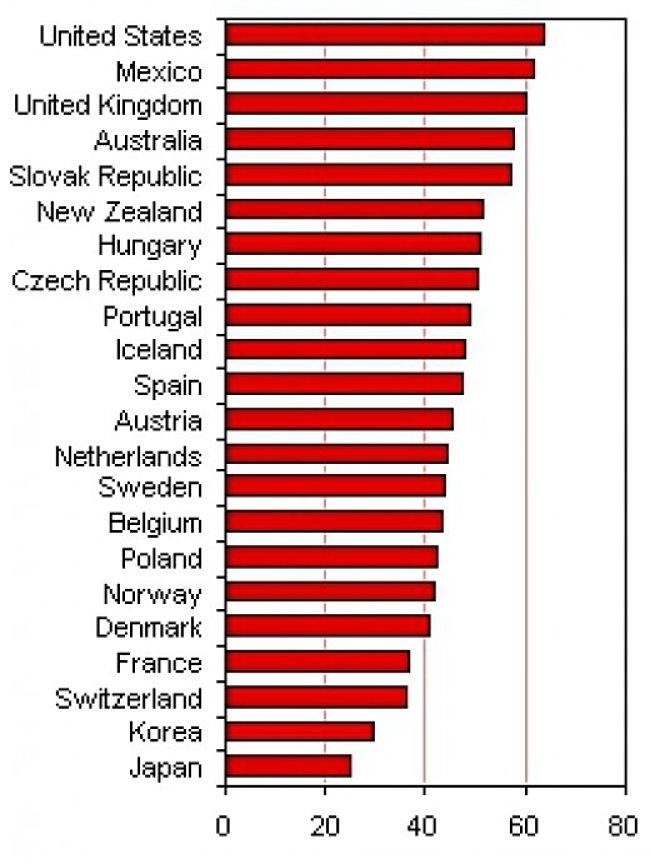
The World is Adopting a Fat Stigma
China is paying the price of increased affluence and adopting western lifestyles including diet changes and overeating. China now has an alarming rate of increase in childhood obesity. A study over almost 30 years that follows weight change in 28,000 adolescents and children showed that while <1% of children and adolescents were obese in 1985, about 17% of boys and 9% of girls were obese in 2014. The gender difference may be related to societal preference for sons who may get more sugary soft drinks and other treats.
The increases obesity coincides with increases in the average incomes in rural households throughout China. People eat more, including western style sugar laden drinks and snack foods, and are less physically active than they were in the past. The traditional Chinese diet has changed and now is richer in calories, fat and has lower natural fiber.
It appears that computer games and increased times spent indoors are not themselves the major issue. The changes in diet are the key. Modern Chinese children now consume large bottles of sugary fizzy drink and eat calorie and fat laden foods. They do not burn off the extra calories in exercise.
A recent study published in Current Anthroplogy showed some disturbing international trends. The research team interviewed about 700 adults from urban area in 10 countries around the world. The aim was to examine how various cultures view and stigmatise excess weight and obesity. This study included people from many countries that have traditionally had a positive view about being fat and have traditionally been 'fat-positive'. The study was limited by the small sample size and by not including Asian or Arab countries, but is was very revealing of a disturbing trend towards fat stigma.
The study found that there was a world wide set of stigmas against being fat:
- The belief that obesity is a disease - Those that have it need to be treated
- The individual is responsible for weight gain and loss - Its their fault
- Being fat is socially undesirable and fat people are ostracise and poked fun at
- While open prejudice against being fat was regarded as being inappropriate it was still practiced in a general way through nicknames and jokes
The study suggested that there was a rapidly growing trend for globalization of fat stigma. Overweight people in all societies are being viewed as rejects, ugly, lazy, undesirable and lacking in self control. In Western societies slim bodies have always been the ideal, except for fat babies which were generally been promoted as being healthy and a credit to good motherhood. However this is not true in many other societies around the world. In Puerto Rico, American Samoa and Tanzania, for example, fuller and fat bodies have traditionally been regarded as a symbol of generosity, success, wealth, fertility and beauty. But the Western way of looking at obesity appears to be over-riding these traditional beliefs.
The researchers surveyed people in Argentina, Mexico, Paraguay, the U.S., and the U.K. American Samoa, Puerto Rico, and Tanzania. The surveys asked people if they agreed or disagreed with a series of statements about body size. Some statements were negative about being overweight - "People are overweight because they are lazy" others were fat-positive "A big woman is a beautiful woman", “Some people are fated to be obese.”
The responses largely reflected Western attitudes. Surprisingly the highest fat stigma scores were not in the US or the UK but in Mexico, American Samoa and Paraguay.
Many societies that have only recently shifted from 'Fat is Beautiful' to 'Thin is In' were the quickest to develop fat stigmas. These recent converts were much more prejudiced and were much more likely to agree with prejudicial statements like 'fat people are lazy.' As more people around the world gain weight, it is likely that the profound emotional effects of fat stigma, may become more of a problem especially for young people.
The research study did not investigate what was the cause of this rapid shift in attitude, but the researchers stated the that global public health campaigns and weight loss scare tactics may be playing a role.
While fat people have traditionally been made fun of, have been given nicknames and are the butt of many jokes, there was a clear hardening in the attitudes. Overweight people are now much more likely to be held personally responsible for being overweight. It is now regarded as their fault rather than being due to inheritance, environmental or social factors.
Many weight loss ad campaigns have strong negative health messages and negative moral messages associated with them. A campaign that focuses on messages such as ‘You can change,’ "Get off the Couch and do something about it" can be easily interpreted as ‘Its all your fault,’ You're Fat because you won't change your bad habits'. Fat Stigma is serious.
When governments or other authorities push these messages, the general public is quick to adopt the same attitudes. The fundamental message is that fat people deserve shame for being fat - its all their fault. Many thin people eat large quantities of food. Perhaps these are the lucky ones who have a genetic pre-disposition for a high metabolic rate or to cope with the Western 'Up-size Me' diets and foods without getting fat. Many thin people are destined to get fat. Are the real problems and causes of the obesity epidemic being addressed?
----------------------------------------------------------------------------

Effects of Fat Stigma on People's Lives
Various studies have shown that obese individuals are regarded by others as sad, self-indulgent, unlikable, ugly, stupid, mean, sloppy, lazy, dishonest, worried, and emotionally impaired. In the US, obese people, are under-represented at colleges, less likely to be accepted into prestigious universities and are less likely to have their education funded. Obesity also negatively affects employment prospects and socioeconomic status. For further information on the social impact of fat stigma see:
- Weight Stigmatization and Ideological Beliefs: Relation to Psychological Functioning in Obese Adults
- Obesity as a Marginalized and Liminal Experience
Obesity as a medical condition
Obesity has been regarded mostly as a medical condition. Most research has focused on the health consequences and medical treatment of obesity. The social aspects of obesity have only been studied over the last 20 years and there are few studies available.
Obesity as a Condition Needing Treatment
In Western culture, obesity is viewed as an abnormality and a stigmatized condition, which can lead to obese people being marginalised. Obesity has been regarded as a curable medical condition. Obese people have been viewed as needing of rehabilitative treatment. In a sense an over-weight person is at risk of developing a chronic weight-related disease. This means that the over-weight person is regarded as already ill or is ’pre-ill’. Obese people therefore find themselves as not feeling ill, but are being treated as if they had a medical problem needing treatment.
Obesity as a Sign of Moral Weakness
Regarding obesity as an abnormality has a number of major consequences because fat people live in what is regarded as abnormal and unacceptable bodies. In Western culture thinness does not just mean the size and shape of the body, but it is correlated with such endearing qualities as being attractive, healthy, and in control. In contrast, a fat body is regarded as a symbol of poor health, inefficiency, a life postponed, and showing a lack of personal will.
Research has shown that fat people are stigmatized both for their body size and shape, and their assumed moral weakness. This has led to weight-based discrimination in society in areas such as education, health care and employment.
Obesity as an Abnormality
In Western culture, a thin body is regarded as the ‘original’ or 'normal' body, whereas obesity is viewed as a ‘temporary disruption’ to the normal balance of the original or standard body. The obese body is regarded as abnormal and needing to be transformed.
The concept that a person could be born fat and stay fat all their lives, or that a person could become permanently fat is not accept by society.
The obese body must be standardized and normalized. However, this is in stark contrast to reality, as more and more people are permanently fat.
The goal of obesity treatment is to transform the fat body and get back to the ‘original body’ through surgery, dieting and other means. Most fat people are dieting or trying to lose weight to transform their bodies but most fail.
Recent recent research has shown that only about 6% of the dieters manage to lose weight and maintain their goal weight for any period of time. Frequent relapses and episodes of weight-cycling are very common as dieters lose weight only to put in on again.
For many over-weight people, dieting becomes a permanent frustrating lifestyle with the person stuck in limbo dealing with endless failure and despair.
Very few studies have examined the pain, psychological strain and emotional stress involved in living inside an abnormal body that has to be the transformed to be acceptable. Many fat people live in a permanent state of expecting a transformation to the 'perfect body' but constantly failing.
Obese People Just Have to Lose Weight
It is expected that obese people, especially women will be constantly striving to lose weight. Even when they are not on a diet, many people feel that have to talk about going on diet, because that is what is expected of them.
The acceptance of this expectation to diet affirms that the person knows their weight is unacceptable. It also affirms that the person wants to transform back to ‘normal’. They try to lose weight and fail and these endless cycles leaves them in a state of limbo accepting their abnormality and being condemned because they cannot get the weight back to normal.
Obese People Postpone their Lives and live Half-Lives
Most overweight and obese people tend to postpone their life experiences looking forward to a future when they have lost weight. Obesity is not seen as a comfortable and fulfilling position to be in, because of the pressures of society and their low self-esteem. Obesity is seen as a personal failure. All aspects of the person's life and future expectation are tainted by the experience of living in an abnormal and unacceptable body.
Low esteem, lack of self-confidence and feelings of inferiority are compounded by the frustration of continually failing to lose weight, self-blaming and self-loathing. All of the difficulties in life tend to be associated with being fat.
The following quote typifies the situation of many over-weight and obese people. Remember that about 65 % of Americans are now overweight or obese, and this is expected to grow to 75 % by 2015. Many fat people are living 'Half-Lives' and are postponing their life's ambitions.
"Many women in the data in fact tell that they feel that many things are not allowed for them because of their weight. One does not have right to agency and life. They avoid doing things and do not work towards their personal goals or dreams because of their weight including hobbies, relationships, education, travel, job, buying nice clothes etc. A recurring thought in my data begins with " when I lose some weight I am going to ....". The idea is that life can only begin when one has left the state of liminality (in a transitional state) where one feels she is not part of the established social world. Their lives seem to be on hold. All bad things in life happen because of the weight and good things in spite of it."
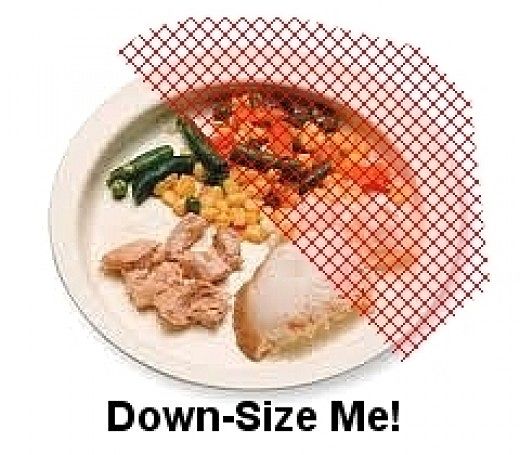

Good Tips for Preventing and Controlling Fat Stigma
- Dump the idea of 'The Perfect Weight', 'The Ideal Weight' - Each and every one of us is unique and these notions may be simply unachievable. Admire the beauty in diversity and avoid the stereotypes of advertising campaigns. Engage each person deeply by looking into their eyes to discover the real person within that has no physical dimensions.
- Encourage depictions of people of various sizes and shapes that have dignity and beauty in many ways. Keep artwork in your home and office that reflects diversity rather than thin stereotypes.
- Do not repeat inaccurate or baseless ideas or make assumptions about others based on shallow assessment of how they look physically.
- Avoid the stereotypes such matching "thinness" - with health or "fatness" - with being unfit and slovenly. Encourage healthy behaviours and diets for everyone. Walking is good for everyone - fat and thin. Eating fresh fruits and vegetables is desirable for everyone, whether they are on a diet or not. Remember that more and more people are getting fat and every thin person could be next in line for "Up-sizing"
- Examine jokes, your language and humour for worn-out stereotypes that are prejudiced and unfair. Humour has many faces. It can help us cope, stop us taking ourselves too seriously, and is often a great way to demonstrate the absurdity of human arrogance. But it can have a nasty side reinforcing worn-out stereotypes that are simply not funny anymore. Always ask yourself the questions. Will it hurt or offend others if they take it the wrong way? Always question your motives. Always be aware of the old adage that real social change occurs when we “afflict the comfortable and comfort the afflicted".
- Respect the privacy of others by keeping questions about health, diet, weight and exercise personal except amongst your closest friends.
- Encourage the design and use of spaces that promote and respect body diversity.
- Encourage participation by including larger people in organizational and social circles.
- Do not encourage or tolerate gossip, put-downs, demeaning comments or prejudicial speech in other people. Tell people what they are saying is or could be offensive to some people. Use snappy comebacks or humour to get the point across.
- Actively try to remove personal prejudices against fat people at work and in your social groups. It is up to all of us to practice inclusion and embrace size diversity, along with other types of diversity.
- Coming Out as Fat - this is described as the experience of choosing to no longer pass as 'on-the-way-to thin'. It means actively mustering the courage to engage in activities usually thought proper only for thin people, giving up futile diets, and rebuilding self-esteem.
- The catch cry of some is 'We’re here, we’re spheres! Get used to it!'
